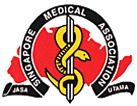
THESMANEWS
Present Issue
Past Issues
Journals
Present Issue
Past
Issues
Letters to the Editor

Dear Sir,
The manpower question
I read with great concern the numbers of physicians needed in S’pore and how to respond to short term contraction of manpower at the medical officer level and the need for retaining physicians in the public sector. Physicians are not a homogenous population. It is a motley crew with characteristics such as the following:
- highly talented (many are computer wizards, accomplished pianists and musicians)
- highly idealistic, especially in their early formative years in the public sector. One or two are pastors in time local Christian churches. A few, in their later years, leave the private sector to return to teach
- high achievers, whether they are doing medicine or chess politics
- highly individualistic like the musicians in a orchestra who knows his/her personal worth
- they have a high sense of self-esteem and have high expectations commensurate with the many years of arduous and expensive training on the part or their parents and the state.
The frustration will grow as the new graduates of the class of the year 2002 (no=180) and 2003 (no=2003) find training prospects ,just as bleak and private sector just as saturated, if not more so than in 1997. It will be a recipe for mass emigration of very expensively trained, high IQ, Singaporeans. The five-year bond will mean that if they wish to switch to another profession such as finance and business, they cannot do so until the ripe old age of 30 years old. By that time, they have families to raise, COEs to pay and housing loans to maintain. Only those with rich parents can afford to bail out and do other things.
How does one go about meeting the expectations and needs of venous subsets of this motley crew? It is difficult a task. The answers are not readily available. Suffice to say that good intentions are not good enough. There need to be various outlets for many things that we as physicians want to do. These areas include, the following (not in order of merit):
- Continuing medical education
- Research
- Job satisfaction
- Volunteer work
- Teaching undergraduate as well as postgraduate
- Recognition for efforts put into the above
- Overseas conferences
- Time with family
- Expression of one’s faith in medical work eg. mission trip abroad
- Espirit de corps. Ask anyone in solo practice and they will tell you that the isolation can reed fear and insecurity as well as a lack of support when patient care goes wrong.
- Earning an income compatible to one’s status. COEs and E-condominiums don’t come within the easy reach of a civil service MO’s pay
- Humane working hours regardless of seniority. Just because the older hospital doctors in the 60’s and 70’s used to work 36 hours at one stretch in those days when Singapore’s population was booming (KKH delivered one baby every minute) does not mean that the young ones these days need to go through the inhumane system that saps not only the physical and mental energy leading to “burnout” but also to an erosion of one’s ideal of altruism.